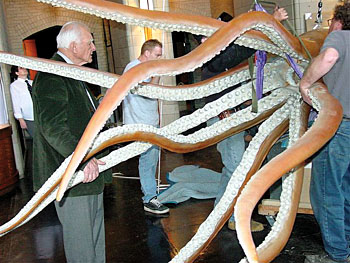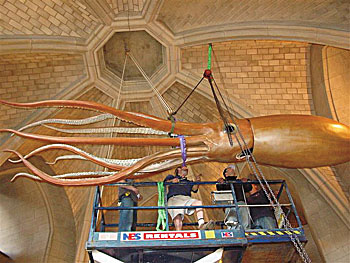 | New Haven native Harry Townshend (far right), who built the model of the giant squid, holds one of its tentacles as the rigging crew prepares to hoist the "creature" to the ceiling of the Peabody Museums main lobby. |
For the first time in a long time, visitors will be welcomed to the Peabody Museum of Natural History with open tentacles.
The Peabody's well-known life-size model of a giant squid has returned to a prominent position in the museum after many years in absentia.
It took a crew of 10 people to transport the massive invertebrate model across Science Hill to the Peabody where it was hoisted to the rotunda ceiling of the museum lobby. The reappearance of the longtime icon is in expectation of the upcoming exhibition "In Search of Giant Squid," which will be on view Sept. 25-Jan. 2.
While giant squid share the body plan of all other squids, they are exponentially bigger than their more common relations. The lengths of the two largest specimens ever recorded were 60 feet -- making the Peabody model, at 35 feet, modest in comparison.
Among those who helped to hoist the creature to the lobby ceiling was longtime New Haven native Harry S. Townshend, who conceived of, underwrote and built the squid in the early 1960s.
Townshend devoted two and a half years of his life to the giant squid project, making four trips to Newfoundland in search of live specimens. The model he constructed is based on several real giant squid specimens caught by fishermen in Newfoundland anxious to collect the reward money Townshend offered.
Yale University and the Peabody Museum have played an important role in the discovery and understanding of the giant squid (Architeuthis). In his many papers on these animals in the 1870s, Addison E. Verrill, Yale's first professor of zoology and one of the three original curators of the Peabody, described 23 specimens then known from North American waters. His work provided most of what was known about this animal until the middle of the 20th century. Some of Verrill's specimens will be featured in the coming exhibition.
The Peabody Museum of Natural History, located at 170 Whitney Ave., is open 10 a.m.-5 p.m. Monday-Saturday, and noon-5 p.m. Sunday. It is closed Memorial Day, July 4, Thanksgiving, Dec 24 and 25, and Jan. 1. Admission is $7 for adults; $6 for seniors age 65 and older; $3 for children ages 3-18 and older students with I.D. There is free admission for all 2-5 p.m. on Thursdays. Museum members, Yale community members with a valid I.D. and children under age 3 are always admitted for free. The museum is wheelchair accessible. Parking is available in the Peabody Visitor Parking Lot, entrance off Whitney Ave., one block north of the museum; follow signs inside the entrance. For directions, events or other information, call (203) 432-5050 or visit the website at www.peabody.yale.edu.
T H I S
With a hoisting of tentacles,
giant squid returns to Peabody

The giant squid has returned in anticipation of the September opening of the "In Search of Giant Squid" exhibition.
Townshend is known as a man of eclectic interests and pursuits -- ranging from two runs for mayor of New Haven (losing to Richard C. Lee in 1961 and 1963) to a 23-year stint as instructor of a Yale course on stream entomology to his current involvement with Fort Nathan Hale and the Quinnipiac Indian legacy.
 W E E K ' S
W E E K ' S S T O R I E S
S T O R I E S![]()
 Alpern named as new medical school dean
Alpern named as new medical school dean![]()
![]()
 Sixteen honored for strengthening town-gown ties
Sixteen honored for strengthening town-gown ties
![]()
![]()
 Author Fadiman named first Francis Writer in Residence
Author Fadiman named first Francis Writer in Residence
![]()
![]()
 Yale counselor helped ease grief of war-torn families in Kosovo and Iraq
Yale counselor helped ease grief of war-torn families in Kosovo and Iraq
![]()
![]()
 Media failed to 'connect the dots' before 9/11, journalist says
Media failed to 'connect the dots' before 9/11, journalist says
![]()
![]()
 With a hoisting of tentacles, giant squid returns to Peabody
With a hoisting of tentacles, giant squid returns to Peabody
![]()
![]()
 Alumni delegates explore issues . . .
Alumni delegates explore issues . . .
![]()
![]()
 Threatened nation-state is topic of two-day YCIAS conference
Threatened nation-state is topic of two-day YCIAS conference
![]()
![]()
 Event showcasing medical students' original research . . .
Event showcasing medical students' original research . . .
![]()
![]()
 New center offers treatment for primary immunodeficiencies
New center offers treatment for primary immunodeficiencies
![]()
![]()
 The letters of literary figures are featured in Beinecke exhibit
The letters of literary figures are featured in Beinecke exhibit
![]()
![]()
 In elderly, recovery from injuries often good . . .
In elderly, recovery from injuries often good . . .
![]()
![]()
 Study: For-profit hospices offer fewer services than non-profits
Study: For-profit hospices offer fewer services than non-profits
![]()
![]()
 Chemotherapy agent called cisplatin effectively transmits . . .
Chemotherapy agent called cisplatin effectively transmits . . .
![]()
![]()
 Scientists learn more about bond of water molecules, protons
Scientists learn more about bond of water molecules, protons
![]()
![]()
 New fund will support YSN faculty's initiatives to improve health care
New fund will support YSN faculty's initiatives to improve health care
![]()
![]()
 Juniors are recognized for scholarship and character
Juniors are recognized for scholarship and character
![]()
![]()
 'Modernist Voices' will explore themes in American and British literature
'Modernist Voices' will explore themes in American and British literature
![]()
![]()
 Dr. Terri Fried lauded for her work in geriatric patient care and research
Dr. Terri Fried lauded for her work in geriatric patient care and research
![]()
![]()
 Event explores new advances in chemical biology
Event explores new advances in chemical biology
![]()
![]()
 Yale Books in Brief
Yale Books in Brief
![]()
![]()
 Campus Notes
Campus Notes
![]()
Bulletin Home |
| Visiting on Campus
Visiting on Campus |
| Calendar of Events
Calendar of Events |
| In the News
In the News![]()
Bulletin Board |
| Classified Ads
Classified Ads |
| Search Archives
Search Archives |
| Deadlines
Deadlines![]()
Bulletin Staff |
| Public Affairs
Public Affairs |
| News Releases
News Releases |
| E-Mail Us
E-Mail Us |
| Yale Home
Yale Home